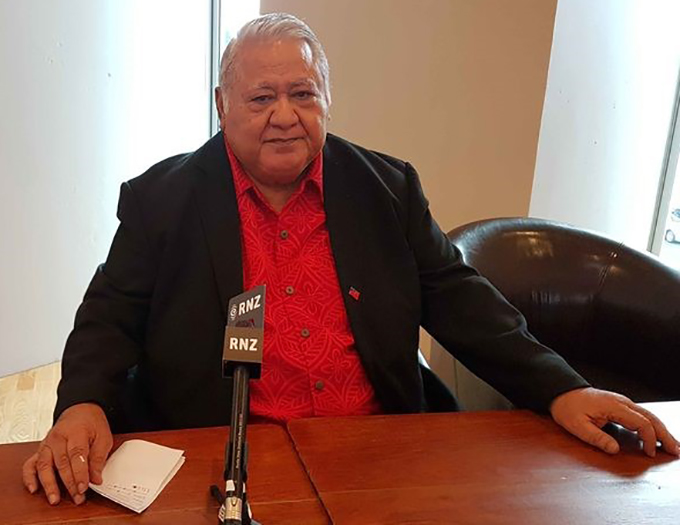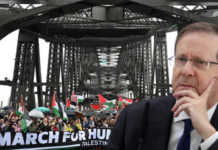
Many Samoans are angry over a threat by the prime minister earlier this year to ban the social media platform Facebook amid growing pressure by politicians and officials across the Pacific against “fundamental freedoms”. Mike Mohr reports for Asia Pacific Journalism in the second of a two-part series on online media.
Samoan Prime Minister Tuilaepa Sa’ilele Maleilegaoi has warned that the social media site Facebook may be banned, and has told users “not to play with fire”.
But the threat earlier this year has drawn mounting criticism from Samoans online.
![]() Public opinion online is suggesting that the Samoan government is threatening people’s right to freedom of expression and their right to free speech.
Public opinion online is suggesting that the Samoan government is threatening people’s right to freedom of expression and their right to free speech.
The Samoa Alliance of Media Practitioner for Development (SAMPOD) opposes any possible ban.
“The right to free expression is fundamental to a democracy like Samoa,” says SAMPOD.
SAMPOD and others who are opposed to the possible ban have cited the UN’s Universal Declaration of Human Rights for the right of the people of Samoa to express their opinions without fear of repercussion from the government.
The Facebook threat – first made in March – is in retaliation to online criticism and scrutiny of the Samoan PM and cabinet ministers by members of the public.
Discontent with officials
Facebook and other social media platforms are being used by members of the public to voice their opinions and discontent with Samoan government officials.
“So, I advise them not to play with fire. I want them to know that no matter where you hide, you will be caught,” he told the Samoa Observer in an interview attacking “faceless writers” on blogs.
The Prime Minister has rejected the opinions and views of online commentators. He has added that these individuals are offending government leaders with their accusations.
“Because it’s all based on lies, those affected are government leaders” he told the Observer.
Although the issue about the threatened ban has been quiet in past weeks, after a recent visit to London for a Commonwealth cybersecurity conference, he renewed his attack on anonymous bloggers.
However, Samoa Observer editor Mata’afa Keni Lesa asked in an editorial why was Tuilaepa so worried and why was he making himself “look like the biggest bully” on a crusade.
The editor said Tuilaepa was “thrilled to finally have learnt that it’s not just Samoa struggling with the issue of faceless writers”.
The prime minister had found that all 53 countries of the Commonwealth had been affected by social media problems ranging from “character assassinations” to many unfounded allegations.
Family insults
The threatened ban on Facebook would be not only for criticism for political decisions, but also for comments regarding family, allegations of corruption and personal insults that are aimed at cabinet members.
“The government will do what it takes to settle this matter once and for all, even if it means banning Facebook,” he told the Observer.
Tuilaepa’s concern is with online social media sites that provide a platform for personal attacks and accusations that he believes are unfounded, misleading and untrue.
Prime Minister Tuilaepa has insisted that these posts and comments had absolutely no truth in them.
Accusation of corruption and unethical relationships are the main reasons for Tuilaepa’s belief that eventually Facebook, and other social media platforms, will be banned.
Government officials are not the only targets of online posts but also their family members.
Alleged sexual relationships between family members is one of the accusation that has provoked feelings of anger by those who are accused of such acts.
He continued by adding that if any of the accusations aimed at government officials were true, they would have been published in the Observer.
The threatened ban would include blogs and other popular social sites and apps.
The Facebook ban is being delayed, according to the Samoa Observer, but it is just a matter of time before Facebook and other online social media sites would be banned.
Blogger identities
The identities of some of the anonymous bloggers are known to the Prime Minister and police investigators, according to an article by Samoa Observer.
O Le Palemia is an anonymous blogger that has been singled out for inflammatory accusations levelled against Prime Minister Tuilaepa and other government officials.
The identity of the O Le Palemia has not yet been uncovered, or has not yet been released publicly.
Tuilaepa has warned that if its behaviour continued, he would be forced to release the names of those that he believes are responsible.
O Le Palemia last month published an attack on some Samoan media, accusing them of publishing “government propaganda”. The blog named Newsline Samoa, Talamua Media and Samoa Planet.
Website Samoa Planet, founded by Lani Wendt Young and Tuiloma Sina Retzlaff, closed down last month.
There was hesitation in revealing the identities of the online bloggers because of fears of physical attacks by those who the accusations and comments are aimed at or by relatives and supporters.
Tuilaepa is sure that once the identities are revealed the bloggers lives would be in danger because of the severity of the online posts that had provoked anger in government officials.
The Prime Minister is adamant that when information about the identities of the anonymous bloggers is released to the public, violence would ensue in the form of reprisal attacks.
O Le Palemia was shut down in February for breaching Facebook’s community standards, reported RNZ Pacific, but apparently resumed publication.
Police investigation
Tuilaepa said in June police had filed charges against the people suspected of being behind the O Le Palemia blog but he did not name them.
In its statement against the threatened ban, SAMPOD said: “We urge the government to use existing mechanisms to address issues arising from the misuse of Facebook, but humbly caution against the banning of this essential medium of information for the people of Samoa.”
Online comments by fellow Samoans refer to government leaders as “Snowflakes” – a slang term referring to individuals that are “hypersensitive to criticism”, according Wikipedia and Merriam-Webster online.
Mike Maatulimanu Mohr is a student journalist on the Postgraduate Diploma in Communication Studies (Journalism) reporting on the Asia-Pacific Journalism course at AUT University.











































